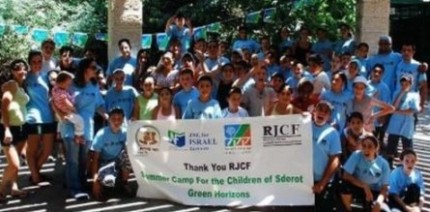Restoring normalcy for children of Sderot [“The Jewish Advocate”, 9/2/2008]
Posted on March 16, 2009
 Last year, when 20 underprivileged children from Sderot, Israel, came to the U.S. to attend camp - 10 campers in Massachusetts, 10 campers in New Hampshire - it was an indicator of the community outreach being made to the helpless children stranded in an embattled city.
Last year, when 20 underprivileged children from Sderot, Israel, came to the U.S. to attend camp - 10 campers in Massachusetts, 10 campers in New Hampshire - it was an indicator of the community outreach being made to the helpless children stranded in an embattled city.
With the precedent set, an expanded collaboration ensued. Already involved as the host for the Sderot kids attending the Russian School of Mathematics camp in Sunapee, N.H., Inessa Rifkin, camp director and principle of the Russian School of Mathematics's Newton location, was joined by the Russian Jewish Community Foundation's Ary Rotman and Greg Margolin, as well Jewish National Fund's Israel Emissary to New England, Col. (Res.) Sharon Davidovich. This group, with integral help from six volunteer counselors from the Sunapee, N.H., camp and six volunteer counselors from JNF's Green Horizons program in Israel, set out to establish a camp for Sderot kids - and did so with uncanny results.
An unusual thing happens when young children are sent to camp; they bond, form friendships, and explore themselves and their environment in ways that they can't in everyday life. But it is assumed that they've already developed a level of interpersonal skills and possess an adequate foundation for learning. For the children in the Israeli city of Sderot, however, the idea of camp and its inherent benefits is a foreign concept. The abundance of educational and developmental opportunities for kids, like those obtainable in the States, are also absent in Sderot. That's precisely why the collaborators decided to bring a camp to the city.
"None of the organizations could do this alone," Rifkin assessed. "The idea, which we had for a long time, was to build a camp in Israel. We needed everybody's help. The RJCF couldn't do it without somebody in Israel, which is where Green Horizons came in. Then we had (the Russian School of Mathmatics's) six counselors who were responsible for camp programming, and then we had two representatives from Sderot, who helped as well. I truly believe that none of the organizations could do it alone."
And indeed, it was a communal effort. Each organization played a vital role, which culminated when 52 children from Sderot attended camp in the Golan Heights. In total, the RJCF raised $150,000 for Sderot services, which included, in addition to the two-week camp in the Golan Heights, a bomb shelter and an afterschool program. Margolin was extremely pleased with the visible results.
"[The Sderot kids] got a chance in life," Margolin said about the Golan camp. "They saw that the world is big and that there is a community of people who care about them very much. People who care enough to help them and provide them with an opportunity. They saw a bigger world outside of being under Qassam attacks and being completely abandoned by Israeli society. It's nice to bring kids here, but this is just the beginning. What we did this year is more than just for attention.
We put forth a sustainable effort. But most importantly, the kids saw that there are people who care."
There are already plans underway for another camp in Israel, again being orchestrated by many of the same contributors. They will take the lessons learned from this recent camp, and try to increase the opportunities they're giving to the Sderot children. Rimma Pivovarov - one of the six Russian School of Mathematics camp counselors who volunteered for the project - was amazed at the before-and-after difference displayed by the Sderot campers.
"When I first met the kids, they were the most undisciplined children I've ever met in my life," said Pivovarov. "They would jump out of windows if they were bored during math class; it was really, really difficult for the first few days. Eventually, you actually saw the children changing. By the end of camp, kids were crying and thanking you as they were leaving."
By Vladimir Shvorin
This article was published in "The Jewish Advocate"






